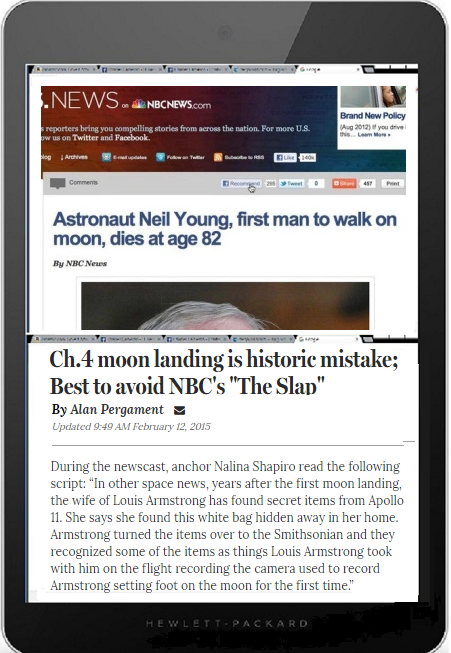Of sundry musicians and their moon walks
[ by Charles Cameron — a jeu d’esprit, really, because i already have my sunday surprise for this week lined up, and this was too much fun to miss ]
.
I ran across this tweet this morning from Husain Haqqani, former ambassador of Pakistan to the United States and author of Pakistan: Between Mosque and Military and Magnificent Delusions: Pakistan, the United States, and an Epic History of Misunderstanding, currently with the Hudson Institute:
.@fifiharoon Good thing, too. From Neil Armstrong hearing azan on moon to street iftar on Bond St. What happened to 'do not lie?'
— Husain Haqqani (@husainhaqqani) June 11, 2016
Neil Armstrong? Heard the Islamic Call to Prayer? On the moon?
**
Poets love the moon, almost by definition — the Chinese poet Li Po supposedly drowned while attempting (under the influence) to kiss her face in the Yellow River — so this alleged, though dubious, story was definitely too rich in possibilities for me to ignored. And the Islamic Call to Prayer? According to Nicholas Kristof in the NYT:
Mr. Obama described the call to prayer as “one of the prettiest sounds on Earth at sunset.”
You may or may not agree, but if you want to hear the Call and judge for yourself, you could try listening to one of these videos:
https://www.youtube.com/watch?v=mUHDYlJHaOQ https://www.youtube.com/watch?v=otdgbR3yso0 https://www.youtube.com/watch?v=T8o6WKTQpMc
**
That’s what led me to my second discovery –one which might be excused by blaming autocorrect, twice, for suggesting that Neil Young — he of the voice, upper panel below — and Louis Arnmstrong — he of the trumpet, lower panel — were each the first man to land on the moon, per (in both cases) NBC.
In all fairness, it’s worth noting that other candidates for moon walks include Buzz Lightyear, Lance Armstrong, and Michael Jackson.
**
Sources:
Mix 104.1, Twitter Confuses Neil Armstrong With Lance and Louis Buffalo News, Ch.4 moon landing is historic mistake; Best to avoid NBC’s “The Slap”
**
None of these mistakes are critical, however, if you believe the late Srila Prabhupada, who introduced Krishna Consciousness to the United States. As someone fascinated by different cosmologies and theologies, I remember reading of Prabhupada’s claim that the moon landing was faked in a California film studio in his magazine some time in the 1970s. No longer having access to the magazine, and looking for confirmation of that memory, I found this page, Srila Prabhupadas statements about the moon landing, of considerable interest:
Srila Prabhuapda himself said different things at different times. Sometimes he directly said they didn’t go and it was some kind of hoax. And at other times he said they didn’t go to the moon because they didn’t experience the higher dimensional nature of the moon planet, which is a rational way to harmonize the Vedic perspective with the idea of three dimensional space travel. At other times he just said the whole idea was foolish and a waste of money. He saw material space travel as a foolish attempt to reach higher dimensions which can only be reached by yogic practice.
Bear in mind too that both Joseph Smith and L Ron Hubbard also taught their followers about significant planets that do not form part of the standard astronomical account of deep space — or the heavens, in other words.
And Charles Williams — the brilliant Dante scholar, Arthurian poet, novelist, theologian of Romantic Love, and friend of JRR Tolkien and CS Lewis — offers a striking near-contemporary Christian example of the genre in the opening paragraph of his book, The Descent of the Dove: A Short History of the Holy Spirit in the Church.
The beginning of Christendom, is, strictly, at a point out of time. A metphysical trigonometry finds it among the spiritual Secrets, at the meeting of two heavenward lines, one drawn from Bethany along the Ascent of the Messias, the other from Jerusalem against the Descent of the Paraclete. That measurement, the measurement of eternity in operation, of the bright cloud and the rushing wind, is, in effect, theology.
See also my post, A metaphysical trigonometry.



